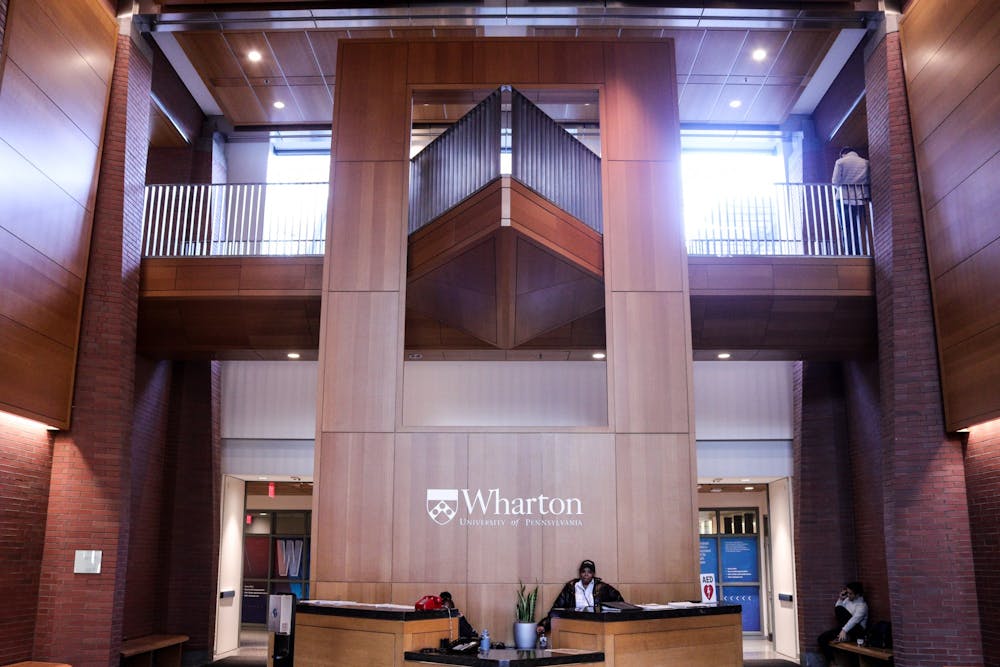
Wharton is still the only U.S. News Top 5 undergraduate business school without an ESG-focused class requirement.
Credit: Abhiram JuvvadiThe Wharton School is undoubtedly a corporate education household name. With an average starting salary of $85,345 for Wharton undergraduates and 53% of the graduating class committing to the financial sector, it is not hard to see how Wharton became famous as the go-to education for finance aficionados. Walking through Huntsman Hall on a weekday only deepens this impression. I spy Patagonia sweatshirts, Pret recyclable latte cups, and ESG-related recruiting or networking session posters everywhere. “Incubate ideas to transform businesses,” reads a flag on the Patty & Jay H. Baker Forum. Yet, a part of its education reluctantly holds onto the past, and changing it may be necessary to stop the climate apocalypse.
Although the University has recently announced its Environmental, Social, and Governance Factors for Business (ESGB) concentration, Wharton is still the only U.S. News Top 5 undergraduate business school without an ESG-focused class requirement, unlike other top-tier institutions, such as UC Berkeley’s Haas School of Business and NYU’s Stern School of Business. That is to say that, against the grain of business education practices, Wharton still pumps high-profile finance professionals into the market who have never set foot in a class about sustainable investment practices. Besides an unwise business decision, avoiding updates to the curriculum make the corporate climate transition challenge even more far-fetched. By not providing ESG education to its students, Wharton is failing to address its socio-environmental responsibility within its core curriculum and putting an expiration date on its alumni.
Wharton famously produces CEOs and managers, but not always for good. J.P. Morgan Chase, Citibank, and Bank of America — all primarily led by Wharton graduates — top the 2020 fossil fuel investments ranking, contributing over $1.5 trillion to the oil and gas market in the last decade. These banks are responsible for providing high-value loans for fuel companies’ expansion projects, such as Citibank’s investment in the highly controversial Enbridge’s Line 3 oil pipe in Minnesota responsible for emitting an additional 193 million tons of carbon dioxide per year. The very same kind of fossil fuel operations that Wharton-run companies fund are directly responsible for emitting 75% of all gases related to the greenhouse effect. Incidentally, these gases caused an increase of 1.8°F in global temperatures from 1901 to 2020, leading to accelerated rising sea levels and the potential displacement of 1.2 billion climate refugees.
Ironically enough, climate change is also expected to increase the rate of flooding and hurricanes in Philadelphia’s University City, harming communities, campuses, and even Huntsman Hall itself. Besides being obviously harmful — and often unethical, the environmentally-oblivious professional performance of Wharton alumni may be a symptom of a failing Wharton education.
The CEO Bubble, a concept introduced by Hal Gregersen for Harvard Business Review, highlights how top executives can become insulated from the fast-pacing changes in the reality of this century and, therefore, turn into obsolete managers. Global investors have identified effective corporate governance and greenhouse gas emission reduction as among the top five priorities for businesses to deliver, according to PwC. Motivated by policy changes, environmental taxes, and media awareness, most markets are shifting towards ESG-compliant practices. From financial taxes in Congress to eco-labeled products on supermarket shelves, climate change conscious measures are undoubtedly proliferating across markets and society. CEOs need to step up their game to continue to generate value.
This investment “green shift” is also a compelling argument for Wharton’s core curriculum transformation. Donations to educational institutions increasingly depend on ESG compliance, and Wharton is losing this money race. In 2021, the University of Michigan, one of Wharton’s direct competitors for the U.S. News Top #1, received an $11 million donation to support its sustainability efforts. By adding an ESG-centered class to its requirements and demonstrating a commitment to sustainability and social responsibility, Wharton can attract donations from investors and philanthropists who prioritize ESG factors. This can also help Wharton stand out among other top business schools and attract students who are looking for a program that values sustainability and social responsibility.
Regardless of how impressive the Wharton brand is in the financial world, it is not immune to reality. As the backbone school of the most relevant banks and investment funds on Earth, failing to update its practices is not only a bad business strategy but also causes indirect harm to billions of people. Warren Buffett famously said, “It takes 20 years to build a reputation and 5 minutes to ruin it”. In Wharton’s case, it may take a climate apocalypse.

VICTOR DUBEUX is a Wharton and Engineering sophomore studying management and bioengineering from Recife, Brazil. His email is vmpd@wharton.upenn.edu.
The Daily Pennsylvanian is an independent, student-run newspaper. Please consider making a donation to support the coverage that shapes the University. Your generosity ensures a future of strong journalism at Penn.
Donate



